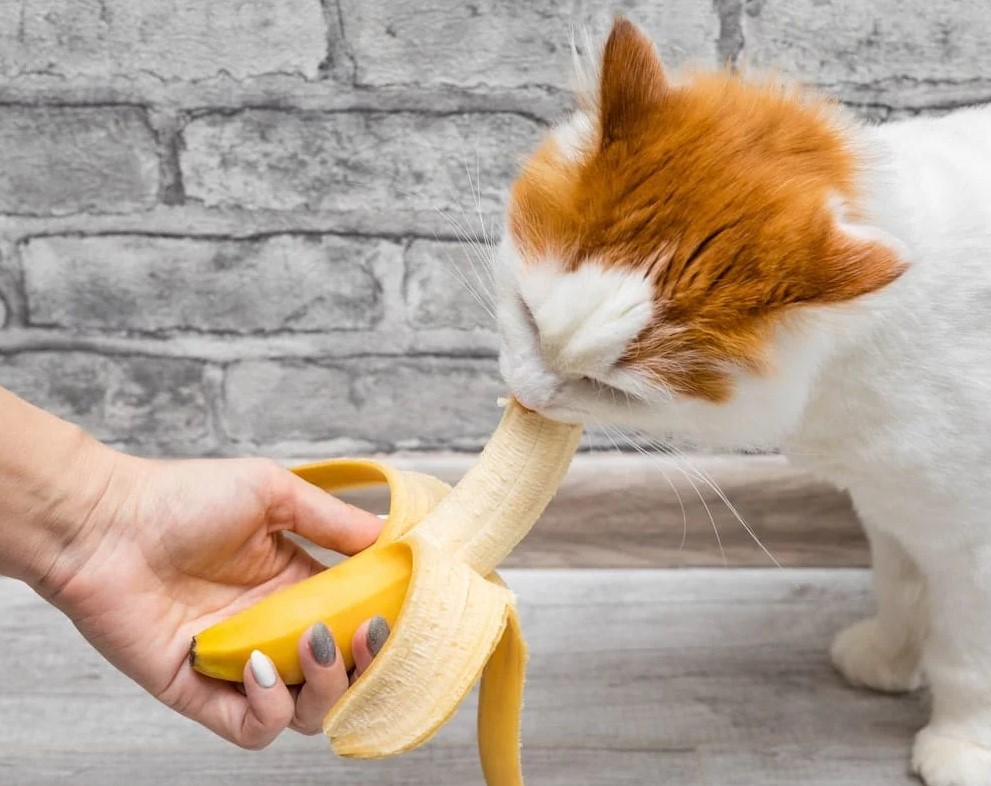Can cats eat bananas? Benefits and harms
Bananas are widely known for their nutritional benefits to humans, but what about cats? Can cats eat bananas? Is it safe for them to eat bananas? In this article, we will dive deep into whether cats can eat bananas, potential health benefits, risks, and how to feed them safely. Follow Cat Memorial Stones !!
Can Cats Eat Bananas?
Yes, cats can eat bananas, but only in moderation and with caution. While bananas are not toxic to cats, they are not a natural part of a feline’s diet. Cats are obligate carnivores, meaning their diet primarily consists of meat and animal-based proteins. Bananas, like other fruits, don’t provide the essential nutrients that cats require, but as an occasional treat, they can be safe in small quantities.

Nutritional Value of Bananas
Bananas are rich in vitamins and minerals, including:
- Potassium: Supports heart and muscle function.
- Vitamin B6: Plays a role in brain function.
- Fiber: Aids in digestion and gut health.
- Vitamin C: An antioxidant that supports the immune system.
However, while these nutrients are beneficial to humans, cats synthesize many of them on their own. Their digestive systems are not optimized to break down large amounts of plant-based foods, so they don’t absorb the same benefits from bananas as humans do.
Potential Health Benefits for Cats
Although bananas are not necessary for a cat’s diet, a small piece once in a while could offer minor health benefits, such as:
- Digestive Aid: The fiber in bananas can help with constipation or irregular bowel movements in cats. However, this should only be done in tiny portions to avoid digestive upset.
- Potassium Boost: Potassium helps maintain proper heart function, but since cats usually receive enough potassium from their regular cat food, the benefit is minimal.

Risks of Feeding Bananas to Cats
While bananas aren’t toxic to cats, there are a few risks involved in feeding them this fruit:
- Digestive Upset: Cats have sensitive digestive systems that are not well-equipped to handle large amounts of fruits or sugar. Feeding your cat too much banana can lead to gastrointestinal issues such as vomiting, diarrhea, or constipation.
- High Sugar Content: Bananas contain natural sugars that can contribute to weight gain and even diabetes if consumed in large amounts. Cats don’t have a sweet tooth like humans, and their bodies aren’t designed to process sugar efficiently.
- Choking Hazard: Always cut bananas into small, manageable pieces. Large chunks of food can pose a choking risk, especially for cats that tend to swallow food without chewing properly.
- Allergic Reactions: Although rare, some cats may have an allergic reaction to bananas. If you notice signs of an allergic reaction such as swelling, itching, or difficulty breathing, discontinue feeding bananas and contact your veterinarian immediately.
>>> Click Can cats eat hummus?
Can cats eat bananas for diarrhea?
While bananas are not toxic to cats and can be eaten in small amounts, they are not an ideal remedy for diarrhea in cats. Bananas are high in sugar and carbohydrates, which are not a natural part of a cat’s diet. Cats are obligate carnivores, meaning their bodies are designed to get nutrients from animal products, not from fruits or vegetables.
If your cat has diarrhea, it’s important to address the underlying cause rather than relying on human foods like bananas. Diarrhea in cats can be caused by a variety of factors, including dietary indiscretion, food intolerances, infections, parasites, or more serious health issues.
Here are some steps you can take if your cat has diarrhea:
- Hydration: Ensure your cat has access to plenty of fresh water to prevent dehydration, which can be a concern with diarrhea.
- Bland Diet: You can try feeding your cat a bland diet such as boiled chicken or turkey (without seasoning or bones) or a small amount of plain, canned pumpkin (not pumpkin pie filling) to help firm up the stool.
- Probiotics: Some veterinarians recommend probiotics specifically formulated for cats to help restore the balance of good bacteria in the gut.
- Veterinary Care: If diarrhea persists for more than a day or is accompanied by other symptoms like vomiting, lethargy, or loss of appetite, it’s important to consult a veterinarian for proper diagnosis and treatment.
In summary, while a small piece of banana is unlikely to harm your cat, it is not a recommended remedy for diarrhea. It’s best to consult with a veterinarian to determine the best course of action for your pet’s health.

How to Safely Feed Bananas to Cats
If you want to share a banana with your cat, it’s important to do so safely. Here are a few guidelines to follow:
- Portion Control: Only offer a small slice or tiny piece of banana (about the size of a fingertip) as an occasional treat.
- Monitor Your Cat: After introducing bananas, watch for any signs of digestive upset or allergic reactions.
- Avoid Seasonings: Never feed your cat banana that has been seasoned or flavored with sugar, chocolate, or other additives, as these can be harmful to cats.
Alternatives to Bananas for Cats
If you’re looking for healthy treats to offer your cat, there are better alternatives to bananas that are more aligned with their dietary needs:
- Cooked Chicken or Turkey: These are protein-rich treats that complement a cat’s natural diet.
- Commercial Cat Treats: These are specially formulated to provide the right nutrients without the risk of digestive issues.
- Small Amounts of Catnip or Cat Grass: Many cats enjoy these natural treats, which can aid in digestion and provide mental stimulation.
Conclusion
In conclusion, while cats can safely eat bananas in moderation, they are not an essential part of a feline’s diet. Bananas offer minimal nutritional benefits to cats and can cause digestive upset or other health issues if fed in large quantities. If you’re looking for a treat for your cat, it’s better to stick to foods that align with their natural carnivorous diet.
When introducing any new food to your cat, including bananas, always consult with your veterinarian and monitor your pet for any adverse reactions. Keep in mind that the healthiest diet for your feline friend is a balanced, protein-rich diet that meets all of their specific nutritional needs.
FAQs
- Can cats eat banana peels?
No, cats should not eat banana peels. While bananas themselves are generally safe for cats in small amounts, the peels can be a choking hazard and can also cause digestive problems. The fibrous material in the peel is difficult for cats to digest and can lead to intestinal blockage. It’s best to avoid feeding your cat any part of a banana peel. If you want to offer your cat a treat, stick to small amounts of the actual fruit.
- Can cats eat banana bread?
No, cats should not eat banana bread. While bananas themselves are generally safe for cats in small amounts, the other ingredients in banana bread, such as sugar, butter, and flour, can be harmful to them. These ingredients can lead to digestive issues, weight gain, and other health problems.
It’s best to stick to a diet specifically formulated for cats to ensure they get the necessary nutrients and avoid any potential health risks. If you have concerns about your cat’s diet, consult with a veterinarian.
- Can cats have banana pudding?
While cats can technically eat bananas, banana pudding is generally not recommended.
Here’s why:
- Sugar content: Banana pudding is often high in sugar, which can lead to obesity, diabetes, and other health problems in cats.
- Dairy: Many banana pudding recipes contain dairy products like milk and cream, which can cause digestive issues in cats that are lactose intolerant.
- Other ingredients: Some banana pudding recipes may contain artificial sweeteners or flavorings that could also be harmful to cats.
If you want to give your cat a treat, it’s best to stick to cat-specific treats or a small amount of plain banana. Always consult with your veterinarian before introducing new foods to your cat’s diet.
>>> Click Can cats eat honey? Is honey toxic to cats?
